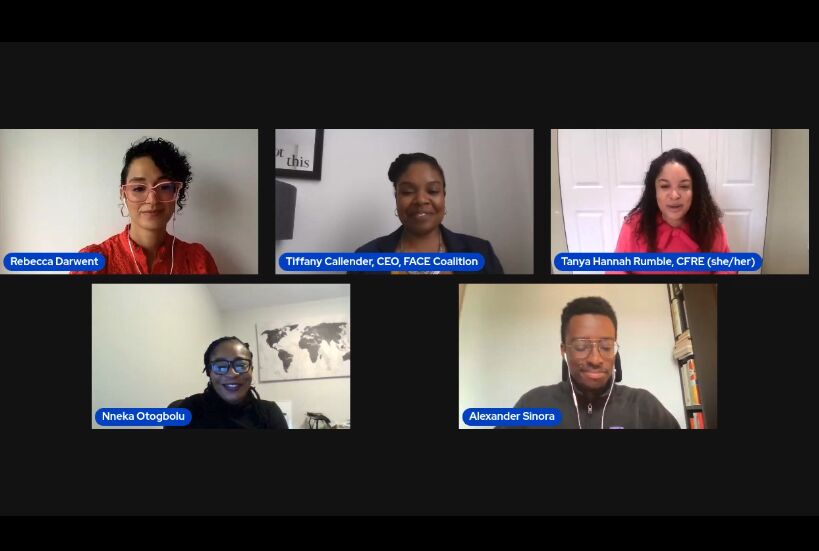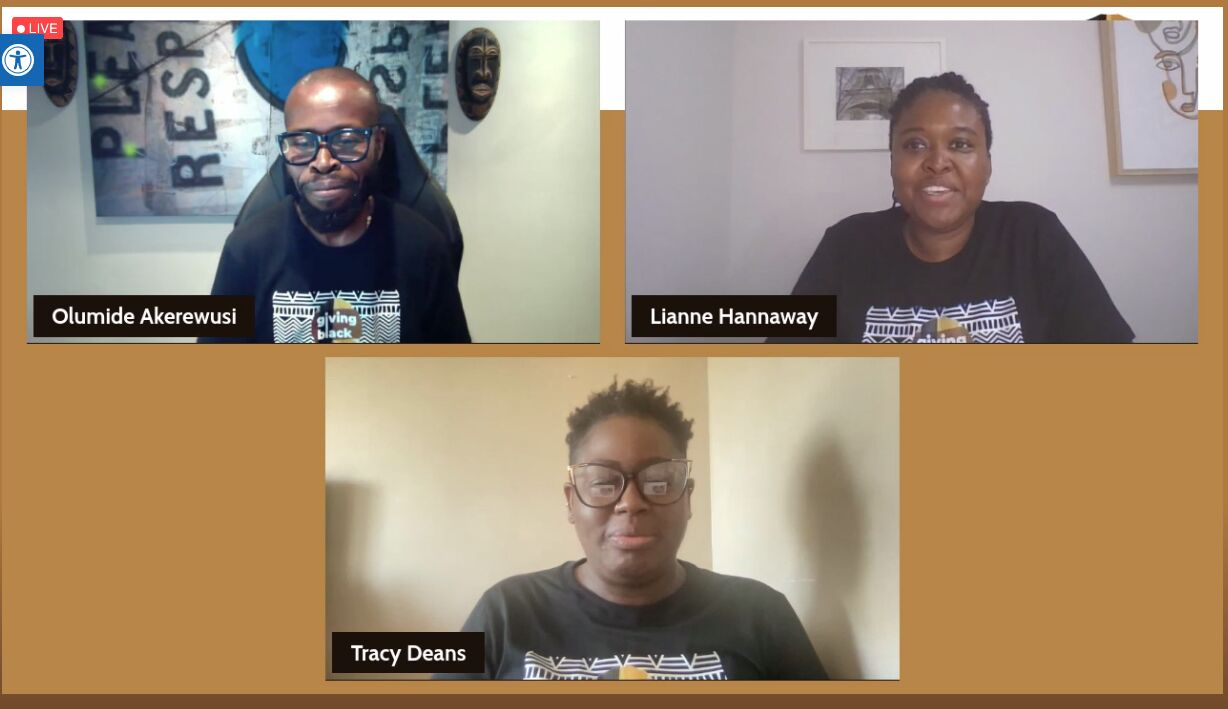Black philanthropy leaders transitioning from sprint to marathon
Why It Matters
Many nonprofit teams are working hard to ensure their policies create equitable opportunities for Black colleagues. Two Black Philanthropy Month conferences offered new insights and strategies for pushing this work forward.

This journalism is made possible by the Future of Good editorial fellowship covering the social impact world’s rapidly changing funding and business models, supported by Future of Good, Community Foundations of Canada, and United Way Centraide Canada. See our editorial ethics and standards here.
Since June 2020, Black leaders in Canadian philanthropy have been sprinting.
They’ve started new organizations, raised new dollars, and spent countless hours educating non-Black Canadians about racism, funding inequities and the need for increased support for Black communities across the country.
In early August, a group of Black leaders had an opportunity to catch their breath and gather together in community at a pair of conferences happening as part of Black Philanthropy Month. The first, hosted on August 9, was a half-day conference led by the Foundation for Black Communities and featured a panel of Canadian philanthropic leaders reflecting on the state of funding in Black communities. The second, hosted two days later, was a half-day event led by consulting firm AgentsC, and included an international panel focused on diversity and corporate community investment in Black communities.
Across the two events, which featured spoken word poetry and storytelling, charity sector leaders shared insights about ongoing challenges, how philanthropy is changing, and reasons for hope and optimism. Future of Good attended both, drawing out key lessons for changemakers across the country.
1) It’s a powerful moment: Blackness is an asset
Black people in Canada have long faced occupational disadvantages in Canada — racism, lower pay, worse working conditions and more. But the tide is turning. “It’s the first time in my professional career that being Black is actually a competitive advantage,” said Tanya Rumble, director of development for Toronto Metropolitan University’s faculty of arts, during a panel on August 9.
Rumble cites some of the common advice that has been passed along, over the years, to Black employees: to “code-switch” with non-Black peers and to “smooth your hair out.”
The tables are turning, however: the lived experience of Black employees is increasingly viewed as an asset by organizations. “The insights we have about our own personal communities and our understanding of racialized communities — that’s an asset and that’s not something you can learn,” Rumble said. Non-Black employees can’t go to a course and acquire that knowledge. It’s connections, lived experience and ways of being that people develop over the course of a lifetime. “That’s exciting and that gives me hope,” she says.
2) Lack of diversity in CSR limits impact
Canadian corporate social responsibility (CSR) teams continue to lack racial diversity. That’s one of the key findings of a forthcoming report, spearheaded by event organizer AgentsC, in partnership with Imagine Canada and RBC Foundation.
Panelist Mark Beckles, vice president of social impact at RBC, said he sees the impact of that lack of diversity in the work that corporations are able to do to support communities. Most people who are building or leading corporate CSR strategies, he says, “are not people who have lived experiences or can even relate to the causes that [they] and their organizations are trying to solve.”
This means these professionals sometimes lack the tools required to get the job done. “It’s like going to a GP when you need an orthopedic surgeon,” Beckles said. Panelists stressed that corporations need to continue to increase racial diversity in their ranks to best achieve their stated impact objectives.
3) Youth leaders are key assets in fight for funding equity
On August 11, panelist Nasra Ayub, an activist and a UK-based staffer for Global Fund for Children, spoke about how Black-led organizations are subtly encouraged to tone down their demands in order to be “palatable” to corporate funders or white-led organizations who control funding pots.
After Floyd was murdered in June 2020, many UK-based corporations were keen to support Black-led initiatives. Since that time, however, Ayub said she’s seen some companies withdraw funding or deem Black organizations too “risky” to fund.
She said organizations with young staffers and members are best positioned to help keep the pressure on corporations because young people are more likely to “cut the bullshit.” They aren’t satisfied with only having a seat at the table. Describing the mentality of young people, she says: “let’s throw the table away and come up with something new.”
4) Weak ties to racialized communities? Put recruitment in the HR budget
Rumble spoke about the many requests she gets from colleagues across the sector who, seeking to hire a racialized staffer, ask her to make introductions or pass along a job posting to her community. When it’s a close friend asking, she says she sometimes does so — but she is increasingly encouraging professional acquaintances to consider hiring a BIPOC-owned recruitment firm to help find qualified candidates.
“What I’m doing, if I’m doing that for free, is undercutting my racialized colleagues who are talent recruiters,” she said.
Fellow panelist, Tiffany Callendar, says she has used HR recruitment firms to grow FACE Coalition (the Federation of African Canadian Economics), a new organization where she serves as CEO, from two staff to 25 within two years. In using recruitment firms, she said, she’s supporting Black-owned businesses and finding great talent outside of her network.
BIPOC Executive Search and Uprising Agency Canada are two Black-owned HR recruiters that support organizations to hire racialized staff.
 Olumide Akerewusi, Lianne Hannaway and Tracy Deans hosted Thursday’s Black Philanthropy Month event, which featured a session on Africville, a Black Nova Scotia community that was destroyed in the 1960s.
Olumide Akerewusi, Lianne Hannaway and Tracy Deans hosted Thursday’s Black Philanthropy Month event, which featured a session on Africville, a Black Nova Scotia community that was destroyed in the 1960s.
5) Investing in history is an important part of investing in the future
On August 11, two Nova Scotia elders, Bernice Arsenault and Beatrice Wilkins, spoke of their childhood in Africville, a predominantly Black community in Halifax, NS that was destroyed by city officials in the 1960s to make way for industrial development. Prior to demolition, Africville was a tight-knit community, home to many long-standing Black-owned businesses.
“It was nice. [It was] peaceful. It was safe,” said Wilkins, reflecting on her childhood there. “We could fish. We could pick our berries if we wanted to make a pie…And one thing that nobody knows, is that this community was never policed. We handled everything ourselves.”
Wilkins is co-founding director of the Africville Genealogy Society, which works to capture memories and educate communities about what happened in Africville — how residents faced marginalization, environmental racism, and relocation at the hands of the city government. Both she and Arsenault stressed the importance of keeping the story of Africville alive — that through understanding the past, we can build a more just future.
“It’s a sad story, but it’s also a story of love,” said Percy Paris, board member of the Africville Heritage Trust, which funds the Africville museum. “It’s a story of love and of resilience and of the lives of a Black community which has been repeated so many times here on the continent of North America.”
6) Foundations finding success building deeper connections with Black communities
For the Edmonton Community Foundation, George Floyd’s murder prompted a conversation about how their organization could provide more support for the city’s Black and Indigenous communities. In short order, they launched an anti-racism funding stream, said Nneka Otogbolu, the foundation’s director of communications and equity, on August 9. But one month after launch, the fund hadn’t received any applications.
Instead of waiting, the foundation started reaching out to community organizations. Otogbolu said it was strange, at first — normally organizations were the ones reaching out to the foundation, not the other way around. But it worked, and it’s shifted the way the foundation approaches community engagement more broadly, she said. Now, there’s “more outreach, more engaging, more learning from our community.”
In the summer of 2020, for instance, two South Sudanese community leaders reached out to the foundation, looking for help — they needed funds to pay for the funerals of community members who had died during the early stages of the pandemic; and they needed assistance in raising awareness about the challenges facing their community.
The foundation did both, Otogbolu said, by working in partnership with this community. In developing a digital story about the challenges they were facing — for instance, the foundation commissioned the work from a South Sudanese journalist working in Regina. And in finding the right team to produce a similar video series, they also compiled a list of local BIPOC video producers, and selected from this list. “[We] learned that asking before assuming we can’t find connections was really helpful,” Otogbolu said.
7) Achieving funding equity for Black communities is a marathon
At both panels, speakers described the diligent work Black communities have undertaken for decades, working to achieve funding equity for Black people with government and the philanthropic sector. To keep the stamina for this work, panelists encouraged one another to build strong connections with other Black professionals and community members.
On August 11, for instance, speaker Nneka Allen, described her work with the Black Canadian Fundraisers Collective, an initiative she founded that provides support and professional development opportunities for Black women fundraisers. In doing so, she drew a link to another Black-led collective that her family has participated in for generations: the Hour-A-Day Study Club, in Windsor, Ontario.
The initiative was founded by Black mothers in 1934, and supports women both to better themselves through devoting an hour per day to reading and analysis, and to support one another by affecting policy change. “Black people have historically created their own freedom,” Allen said. “We intimately know and understand rejection. Therefore we have a deep commitment to creating connection in our community.”
“This is where philanthropy and activism always meet.”
